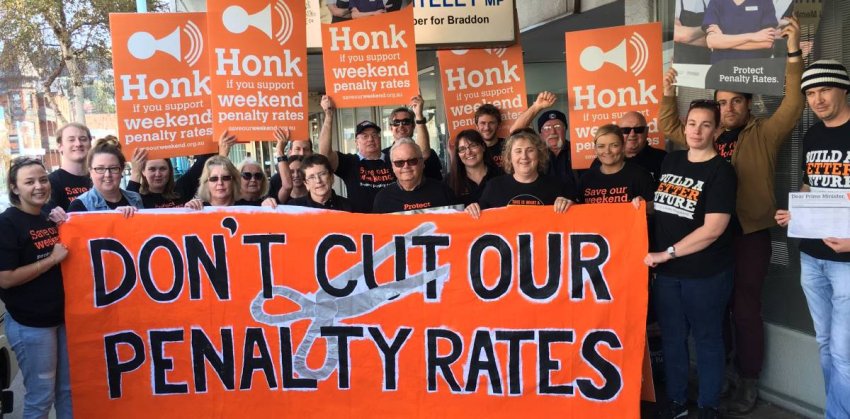
Life is about to get a lot tougher for 700,000 workers and their dependents when the penalty rate cuts hit on July 1. It is also the day politicians will get a 2% pay rise.
Full and part-time workers in the retail, fast food, hospitality and pharmacy industries are the first to be hit. The ACTU calculated that casuals in the pharmacy industry will face an annual cut of up to $6000 as the result of a February ruling by the misnamed Fair Work Commission.
Sunday and holiday rates for hotel and pub workers will be cut from $33.09 to $28.37 an hour; for fast food workers it drops from $29.16 to $24.30 and for retail workers, $38.88 drops to $29.16.
These are not small bikkies: these cuts will mean the difference between people being able to meet everyday household expenses, bills and pay the rent, or not.
For some, these cuts will mean they turn their heaters on less frequently this winter. For others, it will mean having to find another part-time, insecure job.
Meanwhile the Remuneration Tribunal, another “independent” body, has ruled that MPs are underpaid. They will receive a 2% pay rise from July 1. Backbenchers will get $4000 more from July 1, while the Prime Minister will get $10,350 more.
Aside from all their other perks or “entitlements”, MPs annual base wage will rise from $199,040 to $203,020 and the Prime Minister’s pay goes from $517,504 to $527,854. The average cabinet minister will be paid $350,209, Opposition Leader Bill Shorten’s salary will jump to $375,587 and deputy Labor leader Tanya Plibersek will be paid $319,756.
No wonder support for politicians is taking a nose dive.
A June 23 Roy Morgan poll found “economic issues” to be the most important issue for most, and in particular unemployment and housing affordability. Thirty eight per cent said poverty and the gap between the rich and poor are the most important problems facing Australia compared with just 8% for climate change and global warming.
A recent report measuring households’ financial situation found a marked long-term deterioration. It said the gap between the haves and the have-nots is growing and cited “income cuts, record-high job insecurity and high rates of underemployment” as the drivers.
“The reasons for income worries were clear” the report noted. Only 32% of households reported ‘income gains’ over the past year … The rich appear to be getting richer, while the rest of Australia is struggling — there’s a divide across households.”
ABS data reveals real wage growth is at historic lows. Annual wages growth is just 1.9%, below the cost of living rise at 2.1%. No wonder the report said one in three households — or 34% — cited “job insecurity” as a major concern.
Some 56% said they would “struggle to find a new job within two months if they became unemployed”. The report also said that 60% of part-time employees would like to “increase the hours they work” and 70% of casual workers want to “change from casual to permanent employment”.
The latest ABS Labor Force report showed the unemployment rate was 5.7%, the underemployment rate was 8.8% and the underutilisation rate was 14.5%. That adds up to a whopping 20%.
Given this context, the cuts to penalty rates will have an even more devastating impact on those already struggling.
Labor unsuccessfully moved to stop the penalty rate cuts in the federal Parliament. Now Opposition Leader Bill Shorten has pledged to rescind the penalty rate cut if Labor wins the next election.
Having previously said he would abide by the Fair Work Commission umpire, this is a step in the right direction. But relying on governments to protect the poor and marginalised has never been a good strategy. Workers and the community have to mobilise to protect their rights and conditions.
As ACTU secretary Sally McManus told the NexGen 2017 conference “wage theft is a business model” for the bosses.
“The rules that were meant to protect our rights are now not strong enough. They need to be rewritten”, she said on June 25.
They certainly do. The bosses have already said they are not stopping after July 1. They want to extend penalty rate cuts to other workers and eliminate the notion that penalty rates are compensation for people being asked to work unsociable hours — Saturdays, Sundays and public holidays — and that being “underpaid” might be a thing.
McManus cited the anti-WorkChoices campaign as an example of how workers collectively “disrupted” business as usual.
“Wealth and power has become so unbalanced. One group of people now have too much power.
“We need to change the rules to make them pay their fair share of tax. We need to change the rules so working people have more power. Surely the answer to the greed of the few is more power for the many?” she said.
Those facing penalty rate cuts on July 1 cannot wait until the next election, however. Our only real defence is to take action now for all our rights at work as well as our right to work.
Like the article? Subscribe to Green Left now! You can also like us on Facebook and follow us on Twitter.